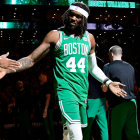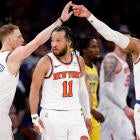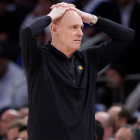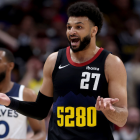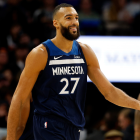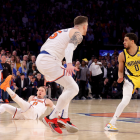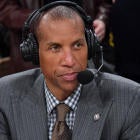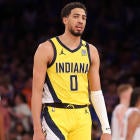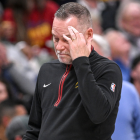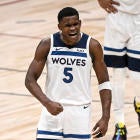
Robert Williams III is staying in the Boston Celtics' starting lineup, coach Joe Mazzulla told reporters Tuesday, the eve of the Eastern Conference finals. Williams changed the Celtics' second-round series against the Philadelphia 76ers when inserted into the starting lineup for Games 6 and 7, roaming off forward P.J. Tucker to protect the paint and disrupt James Harden and Joel Embiid's pick-and-roll game.
Game 1 against the Miami Heat is on Wednesday, but, by letting them know this part of the game plan, Mazzulla has started the chess match early.
What does this mean for the series? Let's dive in.
Who does Williams guard?
Boston's defense is at its best when Williams is not matched up against a screen-setting center. Ideally, he's "guarding" a total non-shooter the way Andrew Bogut guarded Tony Allen eight years ago, but the Celtics are fine with putting him on perimeter players who are inconsistent or reluctant shooters. Williams' 7-foot-6 wingspan is most valuable near the paint, and, paired with his quick feet, he can make long closeouts when necessary. There might not be a Tucker type for him to defend in the Heat's starting lineup, though.
Miami coach Erik Spoelstra started Kevin Love in Game 3 of the first round against the Milwaukee Bucks, and Love has remained in that spot ever since. Love hasn't shot a great percentage on catch-and-shoot 3s since signing with the Heat (35.8% in the playoffs, 32.9% in the regular season), but he's not the kind of guy you leave open -- he has a quick release, shoots at a high volume and went 5 for 11 from deep in the game that ended Milwaukee's season. Unless Mazzulla is comfortable putting Williams on Jimmy Butler and giving the superstar a cushion -- if so, Williams should watch how Anthony Davis defended Butler late in the 2020 NBA Finals -- then the only other options in the Heat's most recent starting five are either shooters (Gabe Vincent, Max Strus) or a skilled big man who can pull Williams away from the basket as a screener and a high-post hub (Bam Adebayo).
But ...
... is Miami going to change its starting lineup?
If the Heat were only concerned about scoring, then this would be simple: Love stays in the starting lineup, so Boston essentially has to choose between putting Williams on him (and risking a barrage of 3s) or Butler (and hoping Williams stays down on pump fakes and out of foul trouble) or Adebayo (and not having a roamer). But Miami also needs to figure out how to stop the Celtics, who scored 117.3 points per 100 possessions in the regular season, the second-best mark in the league, and have been even more efficient in the playoffs.
If Love remains in the starting five, what do Miami's matchups look like? Butler can guard either Jaylen Brown or Jayson Tatum, but who's taking the other one? Adebayo is capable of switching onto perimeter players, but assigning him to one of Boston's stars is A) a lot to ask of him and B) not ideal for rim protection. Brown and Tatum typically hunt Strus; would the Heat just serve him up to one of them?
Spoelstra has options. He could start Love and play a ton of zone, a dangerous strategy against a team that spaces the floor as well as the Celtics but one he has used before. He could start Love and replace Vincent with Kyle Lowry, who only stands 6-foot but plays much bigger -- three years ago, as a member of the Toronto Raptors, he was the primary defender against Tatum in the second round of the playoffs. The simplest solution, however, is to start Caleb Martin instead of Love and put him on Tatum, with Butler on Brown. Martin has made 43.8% of his catch-and-shoot 3s in the playoffs, but he made only 33.3% of them in the regular season, turns down some open looks and does not have as much gravity as Love.
In a way, Mazzulla's starting lineup reveal is a power move: Start Love, and we'll go right at him. Start Martin, and we won't guard him.
Is this a Grant series?
Rob isn't the only interesting Williams in this series. Grant Williams averaged 30.4 minutes in last year's conference finals matchup between these two teams, and, while he wasn't in the rotation at the end of the second round, do not be surprised if he plays a big role against Miami again. He could even take some time away from Time Lord.
The 6-foot-6 forward is strong enough to defend Adebayo one-on-one, and he's been doing it since they were high school rivals in Charlotte and Bam was still going by Edrice. This time last year, after faring well against Kevin Durant and Giannis Antetokounmpo in earlier rounds, the Celtics trusted him in isolation against both Adebayo and Butler.
If Grant Williams' minutes increase throughout this series, it could be a direct result of him holding his own against Adebayo. It could also be because Mazzulla decides he wants to switch everything, a natural counter if Miami is exploiting Robert Williams III's and/or Al Horford's drop coverage. There are multiple ways to protect the rim; one is to play smaller, switchable lineups that can contain dribble penetration and stay out of rotation.
"I think even if we do dictate how the game goes, we have to be ready to adjust," Mazzulla said. "And both teams have the ability to play different ways, play big, play small. And so because of that, we just have to be open-minded to where the game is and how we can have the best impact on it."
Going small, though, would be a bet on Grant Williams forcing the Heat to guard him. He made 38.6% of his catch-and-shoot 3s in the regular season and went 8 for 18 (44.4%) in the first two rounds of the playoffs, but one of the many things he has in common with Tucker is that opponents often treat him like a non-shooter, even after his 7-for-18 performance in Game 7 against Milwaukee last season. Miami disrespected the New York Knicks' role players in the second round, and, just like Boston, it is looking for any opportunity it can to pack the paint.













